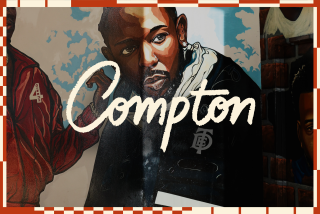A Compton pastor who ‘just seemed to fit right in’ must now move on.
- Share via
David Berkedal had been a minister only two weeks when he entered the narthex of Christ Lutheran Church, passed beneath a stained-glass portrait of the Last Supper and accepted the leadership of his first congregation.
He was white, from a quiet Wisconsin town.
They were black and lived in Compton, which Parade magazine had just listed as one of America’s most dangerous cities.
In the nine years that followed, he learned about the city and learned about himself, developing a wisdom that community leaders say they will miss when Berkedal leaves next week for a church in San Dimas.
“We are not looking for a replacement,” explained Beulah Boykin, a 21-year churchgoer who is congregation president. “We’re looking for another pastor. There will never be another David Berkedal.”
When he walked into the Alondra Boulevard church that first day in 1977, Berkedal “was a young man, unmarried, and had a lot of time to spend with the members,” Boykin said. All of which mattered more than the fact that he was but one of two white clergymen in a community of roughly 200 predominantly black churches--20 for every square mile.
Yet, she said, “we never looked upon David as white.” The young pastor--a former Marine who studied karate but appeared demure behind a pair of glasses--was a gifted teacher. “Even a baby could almost understand the message he was trying to get across,” she explained. And his civic enthusiasm, from writing a weekly newspaper column to serving on a half dozen government committees, made him among the city’s more widely respected religious leaders.
“He was an unusual person,” agreed Dr. C. Albert Henson, president of the city’s Baptist ministers conference. “He just seemed to fit right in.”
From this perspective, the 38-year-old Berkedal--since married and the father of a year-old son--now speaks optimistically about the community with which he has grown.
“Certainly I don’t want to set myself up as an oracle or as an expert on black people,” Berkedal cautioned. “All I can speak about is my experience. I’ve certainly been accepted here to a degree greater than I have any right to expect. Bishop (Desmond) Tutu said that in South Africa it’s a sign of God’s grace if any black person speaks to a white person at all. And I think, in a sense, the same could be said in our culture.”
But after those first years, when Berkedal would be battered by racial slurs as he jogged each morning through his neighborhood near Rosecrans Avenue and Long Beach Boulevard, residents accepted him not as a white man but “a human being . . . “
“It’s taken time, certainly. I had to overcome a lot of people’s preconceptions.”
Berkedal persistently stepped outside his church, taking up causes that concerned Compton residents. For example, when county transportation officials proposed running the new light rail system through the city’s heart, Berkedal was among the voices demanding that the tracks be raised over local streets.
If the problem is not soon solved, he said, “I can really see the potential for civil disobedience, of people standing on the tracks.”
And the pastor became a strong supporter of Supt. Ted D. Kimbrough’s efforts to upgrade the public schools.
“The longer he stays there, the better the education will be,” Berkedal said.
In turn, the pastor learned “to view people in this community more as individuals than as sociological trends or abstractions. I’ve been able to see people in their lives and put things in perspective. Poverty, violence, all that kind of behavior isn’t just a sad picture on TV, these people have lives that sometimes are rich and sometimes are happy. It’s not always negative things.”
Many aspects of Compton are “on the upswing,” he said. There is new housing and commercial development. But what the city still lacks is “a decent, dignified job for everybody who wants one and can work. Something that would give a person a sense of dignity and enough money to support their family . . .
“That, I think, would go a long way to solving the crime and drug problem. It would improve family life, which would then impact on the schools.”
While the city has a long way to go toward dealing with its problems, Berkedal said, it already holds what he considers the key to its future. Throughout the community, people show “a lot of concern . . . And they’re willing to do something to address their own concerns.”
More to Read
Sign up for Essential California
The most important California stories and recommendations in your inbox every morning.
You may occasionally receive promotional content from the Los Angeles Times.











